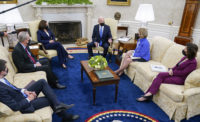President Joe Biden moved the talk about new federal infrastructure legislation into a new phase, convening a White House meeting with Senate public-works leaders to discuss broad principles they would like to see reflected in the envisioned legislation.
At the roughly 70-minute meeting, held on Feb 11 in the Oval Office, the administration was represented by Biden, Vice President Kamala Harris and Transportation Secretary Pete Buttigieg, who attended virtually. Buttigieg is quarantining after a member of his security detail tested positive for COVID-19.
A comprehensive, multi-sector infrastructure package would involve several Senate committees, each of which has jurisdiction over aspects of the hoped-for package. Multiple House committees also will play critical roles.
But this initial session focused just on the Senate and more specifically, on the Environment and Public Works Committee (EPW). which has jurisdiction over highway authorizations and policy, the presumed cornerstone of an infrastructure measure.
Senators at the meeting included EPW Chairman Tom Carper (D-Del.); Shelley Moore Capito (W.Va.), the committee's top Republican; Ben Cardin (D-Md.); and James Inhofe (R- Okla.). Cardin and Inhofe are key members of EPW’s transportation and infrastructure subcommittee. Inhofe also is a former chairman of the full committee.
Jay Hansen, National Asphalt Pavement Association executive vice president for advocacy, said, "The significance of today's meeting with a bipartisan group of senators is that infrastructure was not just a campaign talking point."
Hansen added, "The meeting shows to all of us working on this issue—and the American people—that the President means business and he wants to see a bill from Congress."
He observed that many important and difficult issues lie ahead, including the bill's size, how it will be paid for, and how to deal with Biden's priorities, such as reducing carbon emissions from transportation.
In brief remarks at the beginning of the meeting, Biden referred to EPW as “the key committee,” and noted, according to a White House transcript, that those senators “have a plan…within their jurisdiction” He added, “But they’re also very, very competent senators who know a lot more…beyond their jurisdiction about the things they need.”
Biden also said the previous night he had been on the telephone with Chinese leader Xi Jinping and—apparently referring to China’s infrastructure efforts—added that “if we don’t get moving, they’re going to eat our lunch.”
He added, “They have major, major new initiatives on rail. And they already have rail that goes 225 miles an hour with ease.” Biden said that “they’re working very hard to do what I think we’re going to have to do.”
After Biden took some non-infrastructure questions from reporters, the rest of the session was closed to the press.
White House Press Secretary Jen Psaki said after the meeting wrapped up that attendees discussed “the critical need for investing in modern and sustainable American infrastructure.”
Speaking at the White House briefing, she added that the participants “established the mutual understanding that America needs to build new infrastructure across urban and rural areas and create millions of good-paying jobs in the process of supporting the country’s economic recovery in the months and years ahead."
Psaki said the attendees “also shared the administration’s view for building sustainable infrastructure that will withstand the impacts of climate change and fuel an American clean-energy revolution."
But in response to a question about how much Biden wanted to spend on an infrastructure package, Psaki said "it's a process of ongoing discussions." She added, "But I don't have a number for you. We're not at that stage in the process quite yet."
Carper, Capito Comments
Some senators also issued post-meeting statements, and like Psaki, provided no specifics.
Carper said in a statement that by holding the meeting, Biden "made it clear that investing in our transportation is a top priority. The American people desperately want us to bring our roads, trains and bridges out of the last century and into the future. And President Biden and I know that we need to do that in a way that builds back better, putting our transportation sector on a path to zero emissions and creating millions of good-paying jobs in the process."
He said he is drafting a bipartisan surface transportation bill that achieves those goals and noted that the present surface transportation bill expires in September.
Capito said in a statement that a bipartisan surface transportation bill with long-term funding for highways and bridges is a major priority. She characterized the meeting as "a positive and substantive discussion."
Capito added, “We should be forward leaning when it comes to tackling the transportation needs of today and tomorrow in a way that works for all communities, instead of a one-sized-fits all approach." She also said that the bill should address needs of her home state, "including additional highway capacity, bridge improvements, innovative transportation technologies and expanding broadband infrastructure.”
Hansen said he sees the White House meeting as "very encouraging," and added: "We expect more meetings to come. There is no time to waste."




Post a comment to this article
Report Abusive Comment